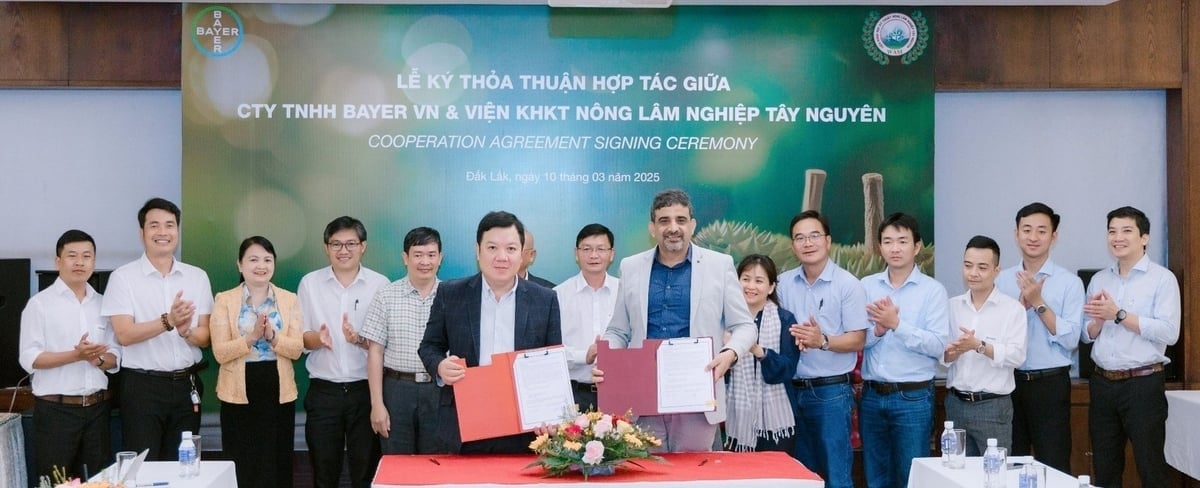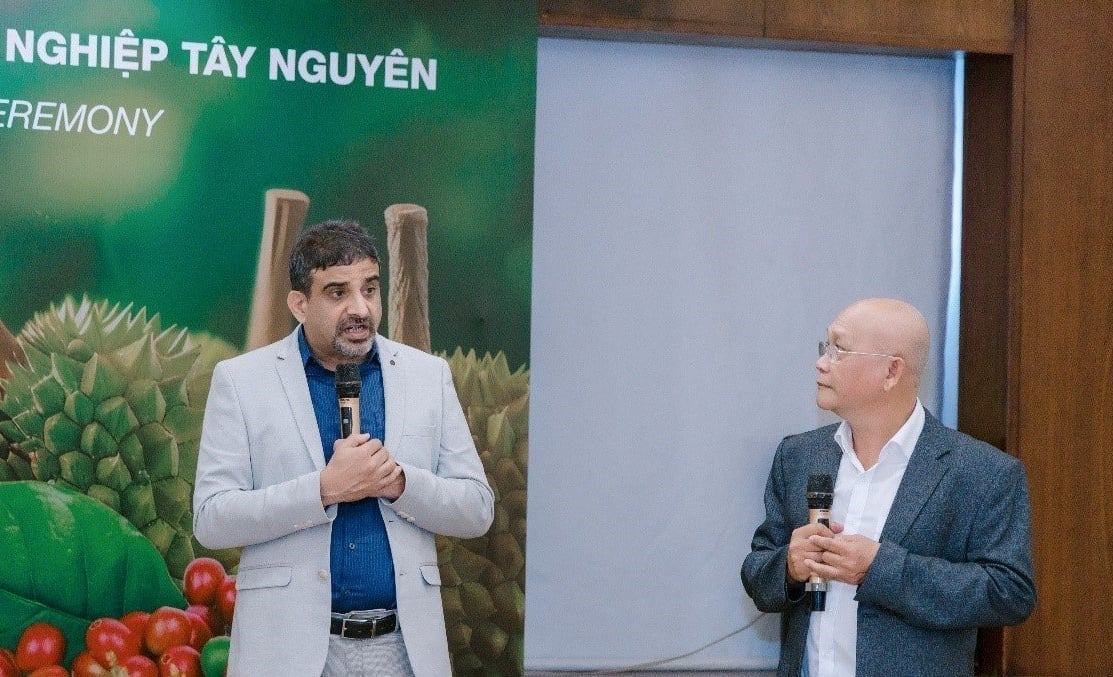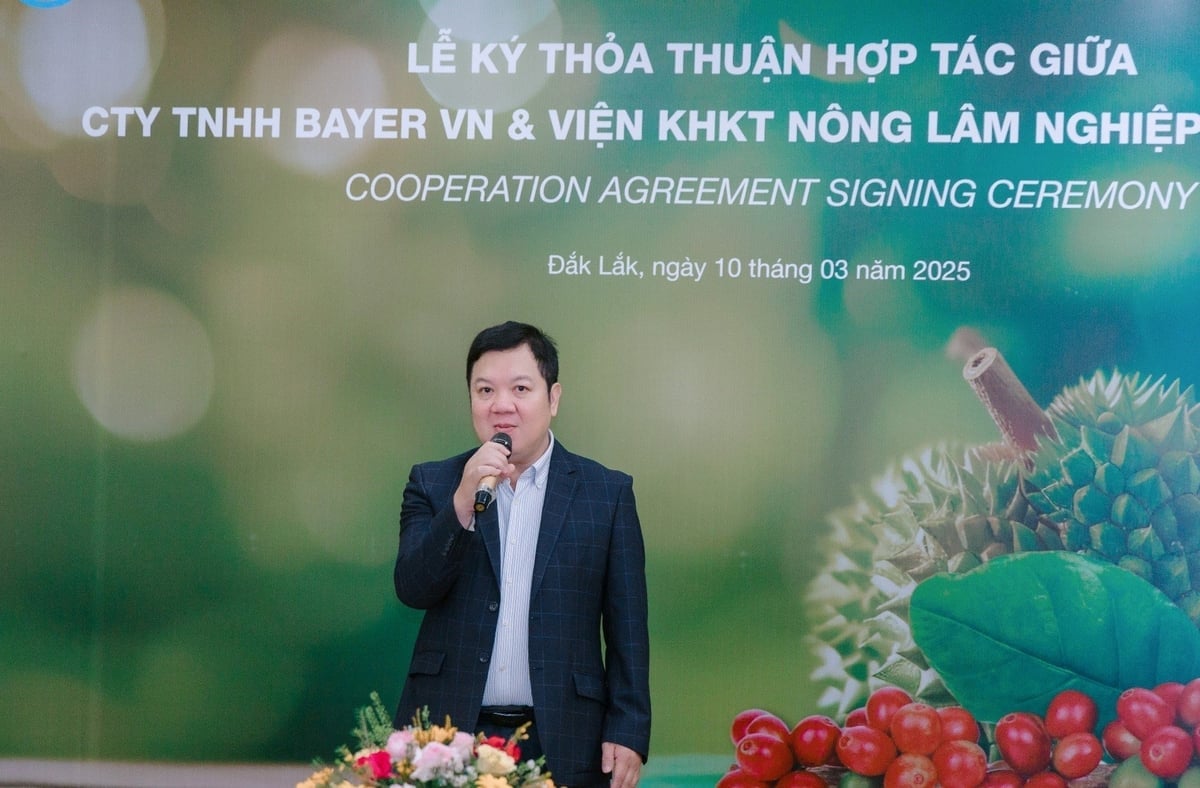June 15, 2025 | 02:38 GMT +7
June 15, 2025 | 02:38 GMT +7
Hotline: 0913.378.918
June 15, 2025 | 02:38 GMT +7
Hotline: 0913.378.918
Bayer Vietnam and the Western Highlands Agriculture And Forestry Science Institute (WASI) recently signed a memorandum of understanding to promote the transition to sustainable farming practices in Dak Lak Province and in the Central Highlands as a whole.
This partnership marks a significant milestone in Bayer’s commitment to promoting sustainable agriculture in Vietnam, particularly through the "Better Life Farming" initiative launched in 2024.

Bayer and WASI entered into a partnership to promote sustainable farming in the Central Highlands. Photo: Nguyen Bao.
Accordingly, Bayer and the Western Highlands Agriculture and Forestry Science Institute have committed to implementing key initiatives, including training programs, knowledge-sharing sessions, technical consultations, and technology transfers for farmers.
These activities aim to help farmers address challenges in agricultural production, with an emphasis on issues related to climate change, pesticide residue management, and improving productivity and product quality.
The parties plan to implement the project in two phases. The first phase, which spans from 2024 to 2025, will focus on developing advanced crop protection solutions to enhance the yield and quality of durian, thereby meeting the expectations of both farmers and the market.
Additionally, the project will establish large-scale model farms in key durian-growing regions to demonstrate the effectiveness of new farming practices.
During the second phase, which spans from 2025 to 2026, the project will expand its collaboration with partners in nutrition and irrigation systems to develop a comprehensive and sustainable cultivation process tailored to the climate and soil conditions of the Central Highlands. Bayer and WASI will also continue organizing workshops and technical conferences to share knowledge and update farmers on new farming techniques, contributing to the region’s agricultural growth.
With the goal of enhancing productivity and the quality of export-oriented agricultural products, the partnership between Bayer and WASI will prioritize several major crops in the region, such as durian and coffee. Bayer is committed to supporting farmers with comprehensive solutions, including crop care and protection and production management. In addition, farmers will receive assistance in improving their production processes to meet international standards, thereby strengthening the competitiveness of Vietnamese agricultural products in export markets.

Kg Krishnamurthy (left), Head of Crop Science (Bayer Vietnam), delivering a speech at the signing ceremony. Photo: Nguyen Bao.
The partnership between Bayer and WASI represents a long-term investment in the development of the farming community. This collaboration aims to create a sustainable ecosystem that enables farmers to overcome immediate challenges and work toward long-term agricultural sustainability.
In his speech at the signing ceremony, Kg Krishnamurthy, Head of Crop Science at Bayer Vietnam, stated: “Supporting smallholder farmers and building a sustainable agricultural value chain requires a long-term vision and collective efforts from multiple stakeholders. That is why we continuously seek and foster partnerships to promote sustainable agricultural development and help farmers address crop production challenges.”
By combining resources and expertise, Bayer and WASI will introduce effective solutions that are both environmentally friendly and safe for human health, tailored to local conditions. These efforts will help farmers achieve higher yields and reach their expected profitability.
At the ceremony, Dr. Phan Viet Ha, Deputy Director of the Western Highlands Agriculture and Forestry Science Institute, highlighted the crucial role of agriculture in the Central Highlands, emphasizing the importance of key crops such as coffee, pepper, and durian.

Dr. Phan Viet Ha, Deputy Director in charge of WASI, seeks to strengthen cooperation for sustainable agricultural development in the Central Highlands. Photo: Nguyen Bao.
Despite significant achievements, agriculture in the Central Highlands continues to face food safety and pesticide residue challenges. In response to these issues, WASI aims to collaborate with partners in researching and developing efficient, high-quality, and safe agricultural production processes.
The company's partnership with Bayer will provide essential resources to enhance training programs, facilitate technology transfer, and expand farmer outreach. Furthermore, both parties will help improve productivity, increase income levels, and build a sustainable future for the farming community.
The transition to sustainable agriculture is a necessary development trend and a crucial factor in the future development of Vietnam’s agricultural sector. With support from Bayer and WASI, farmers in the Central Highlands are gradually improving their livelihoods and contributing to the sustainable growth of the sector.
Translated by Nguyen Hai Long
/2025/06/12/3721-2-202745_83.jpg)
(VAN) TH made an impression at Seoul Food 2025 with its line of natural beverages, paving the way for Vietnamese food products to enter the South Korean market.

(VAN) Soc Trang's success in rice exports stems from a strategy of developing fragrant and specialty rice cultivation areas and standardizing production toward low-emission practices.
/2025/06/11/1311-5-120811_839.jpg)
(VAN) The pig farming industry is facing the challenge of comprehensive restructuring to meet requirements for quality, safety, traceability, and market expansion both domestically and for export.

(VAN) Vietnam considers participating in ALGROALBA in order to expand agricultural production, coordinate the assessment and effective exploitation potential land.
/2025/06/05/5314-1-184727_407.jpg)
(VAN) From seemingly worthless fish scales and skin, enzymes and lactic ferments can transform by-products into peptides, opening a sustainable, effective business direction and elevating Vietnamese seafood.

(VAN) TTC AgriS and IFC signed a strategic partnership to develop a sustainable agricultural value chain, aiming to achieve the Net Zero target by 2035.

(VAN) Seafood by-products are opening a new path, combining green growth and technological innovation to enhance the industry's value.